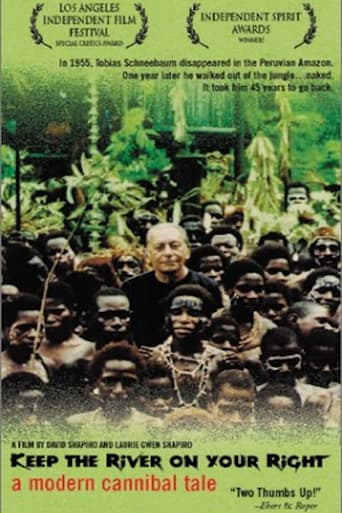merklekranz
"In 1955, Tobias Schneerbaum disappeared in the Peruvian Amazon. One year later he walked out of the jungle...naked. It took him 45 years to go back." Supposedly, "Keep the River On your Right" is "a modern cannibal tale". In reality, anyone looking for some insight into cannibalism will be sadly disappointed. The first half of the movie is more like a travel log of New Ginuea, mostly touting the native art. The second half relies on still photos of a Peruvian cannibal tribe, but really that's about it. Unless of course, you are interested in home movies of a Jewish wedding, or Schneerbaum introducing his former male lovers. I give up. Big disappointment and not really "a modern cannibal tale." - MERK
Leonard Smalls: The Lone Biker of the Apocalypse
So, where are the cannibals? Those intrigued by the title and the 'real cannibal' appeal of this film will be let down. Instead, we are shown a strange man and his re-visiting of a Papua New Guinea village full of natives, one of whom was his lover several decades prior. The man, Tobias Schneebaum is New York Jewish as they come and somehow, this is intertwined with the documentary as he appears in his yamika in several scenes.There are no real cannibals here: only stories relayed by some of the natives and by Tobias himself. Not all together a bad film. Very interesting and great cinematography. Schneebaum remains highly likable throughout and provides us with a fascinating glimpse into a life that is about as far removed from Western Civilization as one can get.It's just not what it claims to be on the cover and in the plot summary.4 out of 10, kids.
Unfunky_UFO
It's rare that you see a documentary as well balanced as this movie. The blend of Tobias's daily life with his adventures in Peru really show both sides of the man. In truth he is a very simple person, but for whatever reason his life sends him visiting ancient cultures in South America. He is a man of many contradictions.While the movie is about Tobias overally, it provides interesting commentary on a number of subjects: loss of culture, aging, homosexuality, even a little commentary on the voyeuristic act of the documentary itself. It's this richness of information that makes the movie so compelling.Unfortunately the filming style is high-handed and sometimes is disruptive. It breaks the old adage that the best camerawork is the kind that is not noticed. Throughout the movie there are annoying closeups and jerky camera movement that is more distracting than useful.Overall, I highly recommend this movie. I'd give it a 9 out of 10. The film style is annoying but the story is first rate. You won't be disappointed.
Tom Dillingham (tfdill)
I read Schneebaum's book (same title as this film) when it was first published and was deeply moved by his ability to see through the many ways of "otherness" (his own and the people of the Amazon with whom he lived and loved) to a way of living a decent life. His subsequent books were not as powerful, but showed his continuing quest. His description of his sexual relations with the men of the tribe was way ahead of its time in the early 60's, but his honesty and openness about it were welcome. This movie beautifully conveys both the quirkiness and generosity of the man, but also provides a glimpse into the inevitable destruction of innocence (which is not a morally positive term, in this case) that occurs when "civilized" men intrude on traditional societies. Even so, Schneebaum himself has moved into a kind of higher innocence that suggests the possibility of saving humanity from its own destructiveness.

